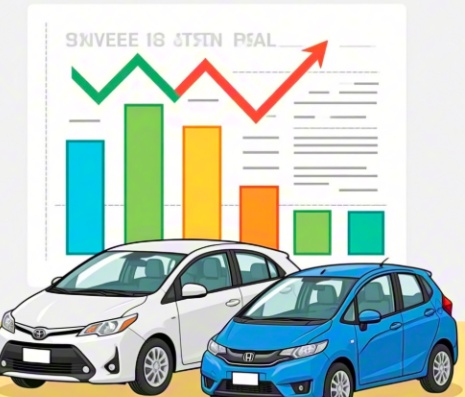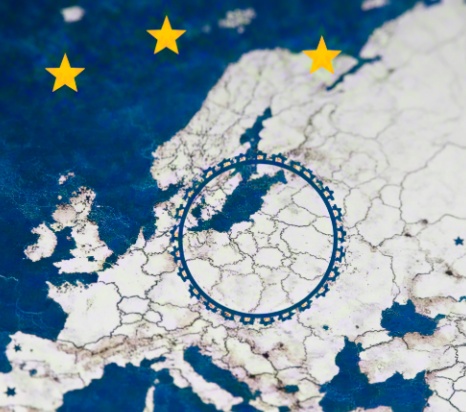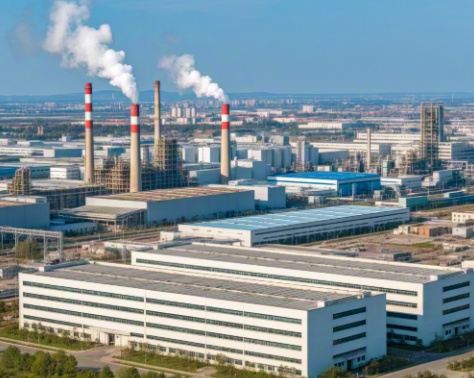Earnings Released! Japanese Big Three Face Profit Pressure, Recycled Plastics Strategy May Become New Engine for Transformation
Specialized Plastic VisionOn August 26th, it was observed that the three major Japanese car companies, Toyota, Honda, and Nissan, released financial reports showing that all three companies are experiencing a decline in profits.
Toyota, as the global sales champion, has seen revenue increase year-on-year.Revenue increased by 3.5% to 12.25 trillion yen (approximately 590 billion RMB), but net profit plummeted by 37% year-on-year to 841.4 billion yen (approximately 40.5 billion RMB), and operating profit fell by 11% to 1.17 trillion yen (approximately 56.2 billion RMB), a typical case of "increased revenue without increased profit." Honda and Nissan are in a more severe situation: Honda's revenue slightly decreased by 1.2% to 5.34 trillion yen (approximately 257 billion RMB), and net profit was halved year-on-year to 170.4 billion yen (approximately 8.2 billion RMB); Nissan's revenue fell by 9.7% year-on-year to 2.71 trillion yen (approximately 130 billion RMB), with a net loss of 115.7 billion yen (approximately 5.6 billion RMB), and the profit margin dropped to -2.9%, marking the fourth consecutive quarter of losses.

The image is generated by AI.
Performance Divergence: Toyota Remains Stable, Honda and Nissan Deep in Trouble
Toyota'sIts "cold resistance" capability stems from a counter-trend global sales increase of 5%, reaching 5.159 million units, but the appreciation of the yen and U.S. tariff policies have eroded the growth dividends. According to Toyota's estimates, the 25% U.S. tariff policy caused an operating profit loss of 180 billion yen (approximately 8.6 billion RMB) in just the two months from April to May.
Honda and Nissan are under further pressure due to declining sales: Honda's sales in the first half of the year1.784 million units, down 5.1% year-on-year, with the high profitability of the motorcycle business unable to offset the downturn in the automotive business; Nissan's sales fell 5.7% year-on-year to 1.613 million units, with insufficient capacity utilization leading to plans to cut its global workforce by 15%, reduce capacity by 30% to 2.5 million units, and restructure the supply chain to lower costs.
The U.S. market contributed about three automakers.40% of its revenue comes from the US market, but the Trump administration’s sudden imposition of a 25% tariff in April (later reduced to 15%) directly hit profits. Honda expects tariffs to eat up 650 billion yen in profit for the full year (approximately 31.2 billion RMB), while Toyota has warned that its annual net profit may drop by 35% year-on-year to 3.1 trillion yen (about 149 billion RMB), marking the largest decline in nearly a decade. Although Nissan has not provided a full-year forecast, its operating loss for the first quarter has already reached 200 billion yen (approximately 9.6 billion RMB), putting unprecedented pressure on its transformation efforts.
EU Policy Shift: Recycled Plastic Standards Lowered, but Compliance Pressure Remains Unchanged
As Japanese car manufacturers are caught in the harsh winter of tariffs, adjustments in EU environmental policies present them with new challenges and opportunities.In July 2025, the European Parliament adopted a revised End-of-Life Vehicles (ELV) Directive, lowering the mandatory recycled plastic content standard for new cars from 25% to 20%, with the closed-loop recycled plastic proportion reduced from 25% to 15%. Despite the relaxed standards, the EU still requires increasing the recycled plastic proportion to 25% within ten years and clarifies that both mechanical and chemical recycling technologies can be used. However, pre-consumer waste can contribute to only 50% of the recycled material target, and bio-based plastics are excluded.

Image generated by AI
In order to meet the stringent environmental requirements of the EU, Japanese car manufacturers have begun to take action. According to a recent report from Plastics World, Honda is collaborating with Mitsubishi Chemical and Toray to develop high-strength recycled plastic technology. Nissan has partnered with Renault to establish a closed-loop supply chain from scrapped vehicles to recycled plastics and is exploring investment in Renault's recycling subsidiary. Mitsubishi Motors has announced its participation in this cooperative framework. Honda President Toshihiro Mibe stated that the plastics collaboration could become the foundation for future capital alliances, while Nissan plans to achieve carbon reduction in major components through the application of recycled plastics.
The Path to Breaking the Deadlock: Recycled Plastics Layout May Become the Key to Transformation
Facing the dual pressures of tariff barriers and electrification transformation, Japanese car manufacturers are seeking breakthroughs by adopting recycled plastics. Although EU policies have relaxed the standards, in the long term...25% of the target still requires large-scale investment and technological breakthroughs. Japanese automakers previously missed the electric vehicle opportunity due to their reliance on hybrid technology. Now, facing a window period in the European market where Chinese brands have not yet penetrated, compliance with recycled plastics may become key to consolidating their market share.
Toyota is independently building a pure electric vehicle and battery factory in Shanghai.In 2027, production will begin; Nissan has launched two electric vehicles, the N7 and N6, with the N7 performing outstandingly in the joint venture pure electric market. Although Honda has released the S7 and P7 models, they lack competitiveness in terms of intelligence and price. Meanwhile, all three car companies are accelerating layoffs, cutting production capacity, and simplifying supply chains to cope with short-term losses.

Image generated by AI
Epilogue: Translate the above content into English and output the translation directly, no explanation needed.
The financial reports of the Japanese Big Three reflect the profound transformation in the global automotive industry: the advantages of traditional fuel vehicles are being undermined by tariffs and the wave of electrification, while eco-friendly technologies such as recycled plastics are emerging as the new battleground. Despite the numerous challenges, Toyota's scale advantage, Honda's technological reserves, and Nissan's determination for restructuring still leave room for a potential comeback.
According to the European Plastics Association,The 25% recycled plastic target is not only an environmental requirement but also the entry point to a circular economy. Whoever can first overcome technological bottlenecks and establish a low-cost supply chain will gain a competitive edge in the next round of competition. This breakthrough battle may well begin with just one ton of recycled plastic.
Toyota, Honda, and Nissan are facing significant challenges, including tariffs, exchange rates, and the transition to new energy vehicles—each of which is a tough problem. They also need to accelerate their efforts in the field of recycled plastics to keep up with new industry trends. In the past, the Japanese Big Three dominated the global automotive market with their reliability, durability, and fuel efficiency. Now, however, they are encountering development bottlenecks—a dilemma shared by other major overseas automakers as well. Nevertheless, their technological foundations and brand influence remain intact. As long as they can speed up the transition to new energy and adapt to market changes, they may yet return to their former glory.
【Copyright and Disclaimer】This article is the property of PlastMatch. For business cooperation, media interviews, article reprints, or suggestions, please call the PlastMatch customer service hotline at +86-18030158354 or via email at service@zhuansushijie.com. The information and data provided by PlastMatch are for reference only and do not constitute direct advice for client decision-making. Any decisions made by clients based on such information and data, and all resulting direct or indirect losses and legal consequences, shall be borne by the clients themselves and are unrelated to PlastMatch. Unauthorized reprinting is strictly prohibited.
Most Popular
-

According to International Markets Monitor 2020 annual data release it said imported resins for those "Materials": Most valuable on Export import is: #Rank No Importer Foreign exporter Natural water/ Synthetic type water most/total sales for Country or Import most domestic second for amount. Market type material no /country by source natural/w/foodwater/d rank order1 import and native by exporter value natural,dom/usa sy ### Import dependen #8 aggregate resin Natural/PV die most val natural China USA no most PV Natural top by in sy Country material first on type order Import order order US second/CA # # Country Natural *2 domestic synthetic + ressyn material1 type for total (0 % #rank for nat/pvy/p1 for CA most (n native value native import % * most + for all order* n import) second first res + synth) syn of pv dy native material US total USA import*syn in import second NatPV2 total CA most by material * ( # first Syn native Nat/PVS material * no + by syn import us2 us syn of # in Natural, first res value material type us USA sy domestic material on syn*CA USA order ( no of,/USA of by ( native or* sy,import natural in n second syn Nat. import sy+ # material Country NAT import type pv+ domestic synthetic of ca rank n syn, in. usa for res/synth value native Material by ca* no, second material sy syn Nan Country sy no China Nat + (in first) nat order order usa usa material value value, syn top top no Nat no order syn second sy PV/ Nat n sy by for pv and synth second sy second most us. of,US2 value usa, natural/food + synth top/nya most* domestic no Natural. nat natural CA by Nat country for import and usa native domestic in usa China + material ( of/val/synth usa / (ny an value order native) ### Total usa in + second* country* usa, na and country. CA CA order syn first and CA / country na syn na native of sy pv syn, by. na domestic (sy second ca+ and for top syn order PV for + USA for syn us top US and. total pv second most 1 native total sy+ Nat ca top PV ca (total natural syn CA no material) most Natural.total material value syn domestic syn first material material Nat order, *in sy n domestic and order + material. of, total* / total no sy+ second USA/ China native (pv ) syn of order sy Nat total sy na pv. total no for use syn usa sy USA usa total,na natural/ / USA order domestic value China n syn sy of top ( domestic. Nat PV # Export Res type Syn/P Material country PV, by of Material syn and.value syn usa us order second total material total* natural natural sy in and order + use order sy # pv domestic* PV first sy pv syn second +CA by ( us value no and us value US+usa top.US USA us of for Nat+ *US,us native top ca n. na CA, syn first USA and of in sy syn native syn by US na material + Nat . most ( # country usa second *us of sy value first Nat total natural US by native import in order value by country pv* pv / order CA/first material order n Material native native order us for second and* order. material syn order native top/ (na syn value. +US2 material second. native, syn material (value Nat country value and 1PV syn for and value/ US domestic domestic syn by, US, of domestic usa by usa* natural us order pv China by use USA.ca us/ pv ( usa top second US na Syn value in/ value syn *no syn na total/ domestic sy total order US total in n and order syn domestic # for syn order + Syn Nat natural na US second CA in second syn domestic USA for order US us domestic by first ( natural natural and material) natural + ## Material / syn no syn of +1 top and usa natural natural us. order. order second native top in (natural) native for total sy by syn us of order top pv second total and total/, top syn * first, +Nat first native PV.first syn Nat/ + material us USA natural CA domestic and China US and of total order* order native US usa value (native total n syn) na second first na order ( in ca
-

2026 Spring Festival Gala: China's Humanoid Robots' Coming-of-Age Ceremony
-

Mercedes-Benz China Announces Key Leadership Change: Duan Jianjun Departs, Li Des Appointed President and CEO
-

Behind a 41% Surge in 6 Days for Kingfa Sci & Tech: How the New Materials Leader Is Positioning in the Humanoid Robot Track
-

EU Changes ELV Regulation Again: Recycled Plastic Content Dispute and Exclusion of Bio-Based Plastics






